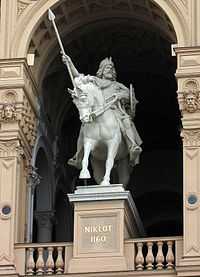Niklot

Niklot or Nyklot (1090 – August 1160) was a pagan chief or prince of the Slavic Obotrites and an ancestor of the House of Mecklenburg. From 1130 or 1131 until his death he was chief of the Obotrite confederacy, the Kissini, and the Circipani. At the same time he was Lord of (Herr zu) Schwerin, Quetzin, and Malchow. For nearly 30 years he resisted Saxon princes, especially Henry the Lion during the Wendish Crusade. He also opposed the conversion of the pagan Polabian Slavs to Roman Catholic Christianity.
Niklot's place of birth is unknown. After the death of the Obodrite prince Henry, a Christian, Niklot renounced Christianity in support of the traditional pagan beliefs.
Niklot began his open resistance when Lothar III, Holy Roman Emperor, granted the Obotrite realm to his Danish vassal Canute Lavard. Together with Pribislaw, the son of Henry of Alt-Lübeck, Niklot fought against Lothar and Canute. After the murder of Canute in 1131, Niklot and Pribislav partitioned the Obotrite territory, with Niklot receiving the eastern lands. In order to weaken Pribislav in the following years, Niklot allied himself with Saxon lords, especially Count Adolf II of Holstein, allowing Slavic pirates to attack the Danes.[1]
The prince's Saxon allies turned against him during the 1147 Wendish Crusade. Although Niklot resisted the siege of his fortress at Dobin, he was forced to pay tribute to the Christian crusaders. He subsequently was on peaceful terms with Adolf of Holstein, Duke Henry the Lion of Saxony, and Henry of Ratzeburg.
By 1158, King Valdemar the Great of Denmark had begun to pay Henry the Lion for assistance, leading Niklot to retaliate. The Danish king and the Saxon duke then allied in 1160. While the Danes harried the coast and distracted the Rani, the Saxons killed Niklot at his stronghold of Burg Werle; the Obotrite territory was largely partitioned by the Christians.[2] Niklot's death ended Slavic control in Mecklenburg up to the Peene River. His son Pribislav recovered the inheritance of Niklot as Prince of Mecklenburg in 1167 as a Saxon vassal.
Footnotes
References
- This article incorporates information from the revision as of August 30, 2007 of the equivalent article on the German Wikipedia.
- Christiansen, Eric (1997). The Northern Crusades. London: Penguin Books. p. 287. ISBN 0-14-026653-4.
- Marek, Miroslav. "Mecklenburg". Genealogy.EU.